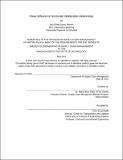Power influence in horizontal collaboration relationships
Author(s)
Suarez Moreno, Juan David
DownloadThesis PDF (1.132Mb)
Advisor
Saenz Gil De Gomez, Maria Jesus
Terms of use
Metadata
Show full item recordAbstract
Supply chain horizontal collaboration has captured the attention of many researchers and practitioners. Horizontal collaboration offers multiple benefits in creating competitive advantages for companies and leveraging their sustainability in the long term. Although collaboration creates value for the supply chain, there is no evidence of what makes companies adopt these schemes since many of these initiatives fail to deliver the expected outcomes. In the core of the collaboration process lies power as an enabler since collaboration relationships arise from the inter-dependency between companies.
This research explores the influence of power in the performance of horizontal collaboration. Using data from the Colombian Ministry of Transportation, a set of 3,276 dyads and 1,095 single companies were identified as performing consolidation during the year 2020. Three different power asymmetries were built to characterize power among these dyads: income, cargo, and network asymmetries.
The effect of power asymmetries was evaluated on two outcome variables: the number of consolidated shipments and the shipping cost per kg. To do this, the augmented inverse propensity weight estimator method (AIPW) is used to analyze the average treatment effects empirically. A set of 16 experiments were conducted to understand the influence of the different asymmetries in the horizontal collaboration performance.
The statistically significant results show that power asymmetries have a negative effect on the number of consolidated shipments, reducing them. However, different effects are account for the shipping cost per kg. Income and Network asymmetries have a positive effect, reducing the shipment cost. Cargo asymmetry has an opposite effect regarding the shipment cost as it is increased when asymmetry is increased.
Significant results are found for network and cargo asymmetry on reducing the number of consolidated shipments. No significant effect is observable on the shipment cost when looking at the asymmetr
Date issued
2021-06Department
Massachusetts Institute of Technology. Supply Chain Management ProgramPublisher
Massachusetts Institute of Technology